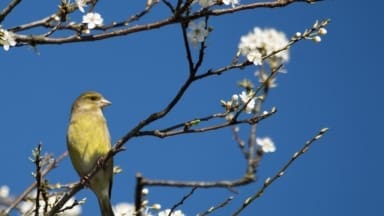
The Zoological Society of London (ZSL)/Garden Wildlife Health (GWH) are currently working in collaboration with the RSPB and the British Trust for Ornithology (BTO), with funding from Natural England (NE) to investigate the transmission risk for trichomonosis in gardens.
The new study aims to improve the understanding of the factors involved in finch trichomonosis outbreaks in garden situations and to learn more about how we can reduce disease risks and improve mitigation measures.
One key aspect of the study involves RSPB scientists visiting gardens with active outbreaks of suspected finch trichomonosis to collect data and samples that will help establish how transmission occurs and what situations might present a high risk.
How can you help?
Wildlife disease surveillance relies on people reporting sick and dead wildlife promptly, and for this new study, the ZSL/GWH are particularly looking for gardens with an active outbreak of finch trichomonosis.
If you see sick or dead Greenfinches or Chaffinches showing signs of possible trichomonosis (see GWH Sympton identification) and would be interested in participating, please do not change your feeding and watering practices* and report the incident to the Garden Wildlife Health (GWH) website at your earliest convenience. GWH wildlife vets will get back to you rapidly to discuss the requirements for the study in detail. Please do not handle sick or dead birds directly. Should movement of a carcass be required, please see the GWH website for more information.
Should you observe sick or dead garden birds that do not fit the above description, or you do not wish to participate in the study, please still report the incident through the GWH Reporting Portal – every single report is invaluable to learn more about the health of British garden wildlife. GWH wildlife vets will subsequently provide further advice. Further information on best-practice for garden bird feeding and disease mitigation can be found in the GWH collaborative Feeding Guidelines.
If you find five or more dead wild birds of any species in the same location at the same time, or one or more dead birds of prey, gulls, swans, geese or ducks, please report this directly to the Government’s avian influenza surveillance portal.
Please be aware that garden birds can be affected by various disease conditions, and whilst the risks are low, some may have the potential to affect humans or domestic animals. Therefore, the GWH recommend always following strict hygiene precautions when interacting with wildlife, such as wearing gloves, not handling sick or dead wildlife directly, and always washing your hands thoroughly.
*The ZSL recognises that this request goes against current best-practice advice of withdrawing supplementary food and water in cases of garden bird trichomonosis being suspected, but in order to improve our understanding and to ultimately help prevent disease outbreaks, it is essential for us to collect information before food and water is removed. We are aiming to collect this necessary data within a few days and only from a small number of gardens, after which removal of food and water as a disease control measure should be implemented.
Further reading
- Robinson, R.A. et al. (2010) Emerging Infectious Disease Leads to Rapid Population Declines of Common British Birds. PLoS ONE 5(8): e12215.
- Lawson, B. et al. (2012) The emergence and spread of finch trichomonosis in the British Isles. Philos. Trans. R. Soc. B Biol. Sci. 367, 2852–2863
- Hanmer, H.J. et al. (2022) Habitat-use influences severe disease-mediated population declines in two of the most common garden bird species in Great Britain. Scientific Reports, 12(1), 15055.
- Trichomonosis: Fatal disease causing rapid decline of our greenfinches (thedirt.news)
- Canadian Wildlife Health Cooperative (CWHC): Strategies to prevent and control bird feeder associated diseases and threats.
- Garden Wildlife Heath: Trichomonosis in Garden Birds

